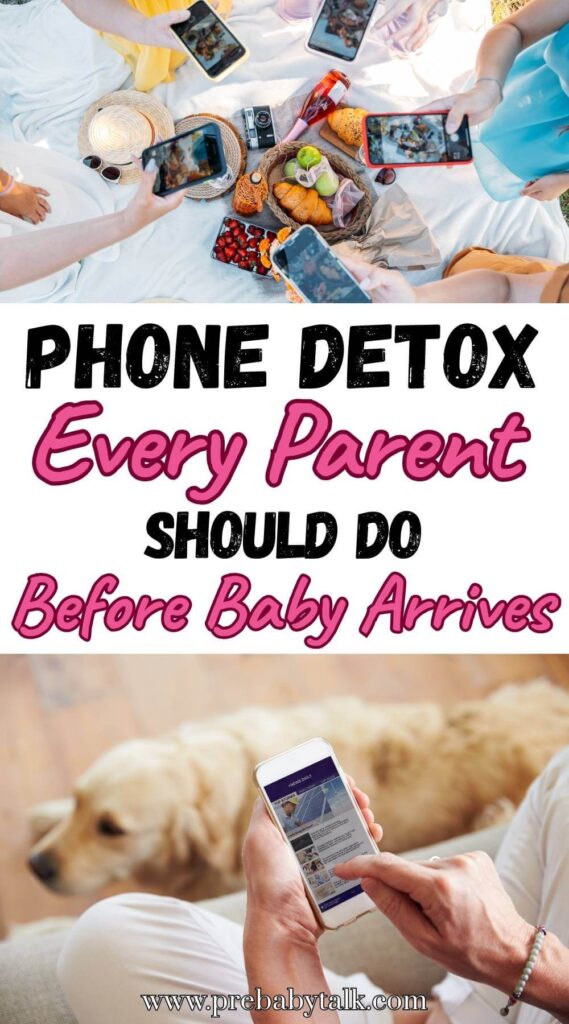This post shows you how to break up with dopamine addiction before the baby comes so you can be more present as a parent!

If you are planning a baby or about to become a parent, chances are that you’re already thinking about what to do with screen time. When to give your baby your phone, should you use an iPad to entertain, and should you give them that distraction so you can do things around the house?
But have you thought about your screen time? What does your digital well-being and activity center say? How many hours a day do you spend endlessly scrolling social media?
In this post, I’ll cover what dopamine (phone) addiction is, how it affects our parenthood, and what we can do to be better parents and give our kids our undivided attention!
Why Do We Talk About Dopamine Addiction When We Talk About Our Phones
Lately, you may have started hearing people talk about dopamine addiction when they talk about smartphone use.
What is dopamine? It’s a feel-good neurotransmitter that we experience when we get a reward.
In the context of our phones, we talk about being addicted to dopamine kicks that we get from social media. The newest form of content that you can find on TikTok, YouTube Shorts, and Instagram Reels pushes short-form content that you may or may not like.
So what happens if you don’t like it? You’re just gonna swipe and move on to the next one, hoping you’ll find something better. That’s exactly how dopamine addiction works.
You are going to see a couple of videos that may or may not interest you, and scroll until you find a “jackpot” – a video that’s got your attention and that you like. That’s when the dopamine kicks in.

Then you’re gonna repeat the same process, knowing that somewhere on that network, there’s another entertaining video that’s gonna give you the same dopamine kick. So that’s why you’ll scroll for hours.
I’m writing this because I’m just like you, and I have spent hours on my phone just trying to entertain myself, escape from work or politics, and try to think about something else.
So when you’re reading this, please don’t take this in the wrong way, I’m with you, not against you, and most importantly, I AM YOU, as I went through this same process.
So this article is not about shame. It’s about deconstructing why we do what we do and getting to the bottom of the dopamine addiction.
Why is this important for all new parents? Because you want to give your kids your undivided attention and prepare your mind and heart for this major shift you’re gonna have.
What Science Says About Dopamine Addiction?
Scientists and researchers believe that smartphone overuse, endless scrolling, and constantly checking your phone are all signs of dopamine addiction.
In a way, if you do this, you are addicted to behavior that operates on the dopamine-driven path, where you do things and expect a reward.
Your brain will chase that dopamine spike, and all social media algorithms are designed to use that system.
“Behavioral addictions are mediated by the same neural processes as drug addictions, notably involving dopaminergic reward circuitry.”
— Volkow, Nora D., et al. “Neurobiologic Advances from the Brain Disease Model of Addiction.” New England Journal of Medicine, 2016.
Your Phone and Your Dopamine Addiction

Every scroll releases a small burst of dopamine, and you feel good for a short microsecond once you see the content that you like.
It can be something that you find funny, entertaining, joyful, but even scary or intriguing. Your brain is looking for a dopamine (feel-good) kick, and it adapts over time.
It simply needs more stimulation to get the same dopamine (feel-good) kick. So, what happens is that you start spending more and more time on social media and start doing what we call “doom scrolling” or endless scrolling, even when the content is not that good.
You will simply be there because you are bored, you won’t find the content entertaining, and that will start looking like a compulsive behavior.
So, like with any addiction, your brain will start to lose self-control and the ability to make a decision to stop scrolling (since it’s not enjoyable anymore). Your brain will be weak. Your willpower will be weakened because you “damaged” it by compulsive behavior.
What happens to you then?
You become less able to regulate yourself. You are distracted, your phone’s got all your attention, and you become a bit emotionally dysregulated.
And then what happens when you don’t feel good anymore? You quit? No, you stay unhappy, but still use your phone and scroll all the time!
“Chronic exposure to rewards that are immediate, easy to access, and highly potent may blunt the brain’s reward pathways, diminishing capacity for delayed gratification.”
— Lembke, Anna. “Dopamine Nation: Finding Balance in the Age of Indulgence,” 2021.
So, what does this have to do with parenting?
Well, everything. As a parent, you need to be present, focused, and eager to participate in your child’s activities. Not distracted, dysregulated, dissociated, and occupied by life happening on social media.
Why Millennial Parents Are Struggling With Phone Use

Millennials are the first generation of parents who have their smartphones on 24/7.
We are the first generation that doesn’t spend a single day without engaging in some form of content, social media, and recently, more and more short-form video content.
This is going to sound scary, but it’s true. Studies show that millennial parents spend between 4-5 hours on their phones every day. (Pew Research Center, 2019)
The majority of the time, we are on social media.
This is a huge problem because you will get distracted. Distracted parenting, where you check your phone very often, can impact your baby’s attachment security and even language development.
When you’re distracted, you are not actively spending time with your baby, learning words, shapes, and colors, so that will impact their language development.
You are also pretty quiet while you’re on your phone, so you won’t talk much. Again, something that impacts the baby’s language development.
Babies favor eye contact, so when they see you looking at a little black screen, they will start to notice that you’re not looking back at them.
“Parent mobile device use is associated with fewer verbal and nonverbal interactions with children, which may have downstream effects on child social-emotional development.”
— McDaniel, Brandon T., and Jenny S. Radesky. “Technoference: Parent Distraction with Technology and Associations with Child Behavior Problems.” Child Development, 2018.
Here are more ways how dopamine addiction affects your parenting!
1 Your Phone Steals Your Attention
As you know by now, constantly checking your phone trains your brain to crave more content, and your brain is looking for short bursts of entertainment.
You won’t be able to dedicate 100% of your attention to your baby all the time. And that’s pretty normal.
But if you spend hours on your phone every day, your baby won’t get that back-and-forth attention they need.
Babies need engaged eye contact where they see and sense that you’re actively involved. That and the sense of security can really help their brain development (Harvard Center on the Developing Child Research).
2 Dopamine Addiction Weakens Your Emotional Regulation

Using your phone overstimulates your brain. Constant overstimulation makes you (and other parents) more irritable and impatient.
That’s not good, as babies are also noisy and very loud, so they will overstimulate you, too!
Then you can become emotionally dysregulated because you’re gonna start feeling stressed.
As a new parent, you will need to learn to be pretty calm, especially when you have to soothe your baby and spend some time with her.
3 Phone Addiction Ruins Attachment Building
I wrote about how being distracted and looking at your phone can mess with secure attachment building.
Secure attachment in babies simply means that your baby will feel that you’re present and responsive.
While I’m sure that you won’t ignore your baby while you’re on your phone, there’s a chance that you won’t be that responsive.
Now, you don’t need to spend 100% of your time engaging in baby play or activities. Babies need to sleep a lot and learn how to entertain themselves. But if you’re on your phone several hours a day, chances are that you’re not going to be present, which will disrupt the attachment-building process.
Some studies show that babies know when a parent is mentally elsewhere (not present), which can cause frustration and crying (McDaniel & Radesky, 2018).
Presence matters more than perfection. Your baby doesn’t need you to be flawless. They need you to be fully there.
4 Ways to Break Up With Dopamine Addiction Before the Baby Comes

Now, I’m going to show you 4 steps to break up with dopamine addiction before the baby comes.
These steps helped my husband and me, and while there’s nothing better than just quitting cold turkey, I think it’s still okay to make small, practical changes before the baby comes.
I just need to add that this is going to be amazing for your baby, and it’s also going to be amazing for you!
Instead of hours of pointless entertainment, you can set aside some time for high-quality reads, check the news, and then simply read and research about your hobbies and things that interest you.
I can assure you, it won’t take more than an hour or two, maximum, to do all of that, and you don’t have to do it every day!
Your life will change so much for the better.
1 Reduce Time Spent on Your Phone
This is something that you can call “no-phone windows.” Like your baby has wake windows, you need to have focused windows where you focus on anything else but your phone.
Some practical things you can do are the following:
- Leave your phone in another room during meals.
- Several days a week, go to the bathroom without your phone! Try it; it’s not impossible.
- Don’t use your phone while you’re getting ready for bed. Read a book instead.
If we count meal times (3 meals x 10-15 minutes), your bathroom break (15 minutes), and getting ready to fall asleep (30-45 minutes), we can make these “no-phone windows” up to 2 hours a day!
Then you can start doing more and more, and soon your days will be longer, and life will be more relaxing!
2 Rewire Your Reward System

So, how do you go to the bathroom without your phone?
Is it possible to stare at your bathroom tiles and not do anything else?
Is it possible to drink morning coffee without looking at your phone?
It is. We just forgot how to do it.
Here’s how you can replace social media scrolling with real dopamine sources:
- Drink your coffee while listening to music, staring through the window, or sitting on your balcony. All you need to do is allow yourself to daydream, let your mind wander, and relax.
- Practice deep breathing and relaxation. When you go to bed in the evening, allow yourself to relax, be present, and focus on your breathing.
- If you need to do something while you have your coffee, why not start some journaling? You can write down your thoughts, dreams, and plans and just let yourself be present and not rush things. Focus on your fingers and your writing. Focus on your thoughts. Let your thoughts flow, and your mind come up with words and ideas that you can write down without rushing.
- When on public transport, try to read a book instead of scrolling your phone. It will make such a difference in your life.
- Go for a nature walk. Spend some time in the sun, fresh air, or even cold air if it’s winter, and enjoy a short walk, even if it’s just around the block. You’ll be present and focused on your body and the sounds of nature.
All of these activities are not just something to do, so you’re not on your phone.
They are actually also dopamine triggers! But unlike using your phone and that whole addiction-unhappiness-doom-scrolling mechanism, these dopamine activities are sustainable and won’t cause such burnout.
3 Set Physical Boundaries When It Comes to Your Phone
Sometimes, you just need simple physical boundaries when it comes to changing your behavior.
The tricky part is that your phone is constantly available, so it’s hard to ignore it.
Here’s how you can redesign your physical space so your phone is not around all the time!
- Keep your phone in your hallway and not your living room or bedroom. It’s important to still be able to hear the ringing in case someone calls or texts, but your phone shouldn’t be within arm’s reach all the time. Don’t carry your phone in your pocket when you’re at home!
- When you go to bed, you can still use your phone as an alarm clock but don’t put it on your nightstand. Put it away so you can reach out if you’re unable to sleep and start scrolling.
- If you’re really struggling with certain apps like TikTok or other video apps, you can set timers to limit your app use to 30 minutes per day or more.
- If you’re at the restaurant or out and about, don’t put your phone on the table. Leave it in your bag, but turn the volume so you can hear the emergency calls. Let yourself be present!
4 Practice to Be Present Before the Baby Comes

The whole point of this website is to help you be prepared for everything that will happen once the baby comes, so naturally, I think we should practice being present now when we still have time to change our habits!
One of the best ways to be present is to stop doing two things at the same time.
For example:
- stop taking your phone to bed when you’re trying to sleep
- don’t have your phone during dinnertime
- don’t watch TV and eat your dinner
- don’t scroll on social media when you’re out with friends (that includes posting your coffees and stories)
- if you’re outside and enjoying some time in nature, don’t look at your phone or check the news
The more you train your brain now, the easier it will be to quit scrolling once the baby comes.
I know that breaking up with dopamine addiction isn’t your typical parenting topic. It’s definitely not a mainstream read. But I truly believe that parenthood is always double work. We work hard to be good parents to our children, and we also have to work just as hard to be good to ourselves.
I like to believe it’s absolutely worth investing every ounce of your strength into becoming a better person for your children and for yourself. Letting go of self-sabotaging and destructive habits is one of the greatest gifts you can give to both of you.
Start today. Your future self will thank you.
Creating better habits and finding ways to break up with dopamine addiction are important parts of the Pre-Baby Talk. That’s why, when the baby comes, you’ll be ready and prepared for…
…all the love in the world.
Do you think it’s important to reduce time spent on your phone before the baby comes? Let me know in the comments!
Don’t forget to pin this post so you’ll always have these tips handy!

Sources:
- Volkow, N.D., Koob, G.F., & McLellan, A.T. (2016). Neurobiologic Advances from the Brain Disease Model of Addiction. New England Journal of Medicine, 374(4), 363-371. https://doi.org/10.1056/NEJMra1511480
- Lembke, A. (2021). Dopamine Nation: Finding Balance in the Age of Indulgence. Dutton.
- McDaniel, B.T., & Radesky, J.S. (2018). Technoference: Parent Distraction with Technology and Associations with Child Behavior Problems. Child Development, 89(1), 100-109.
- Pew Research Center (2019). Millennials stand out for their technology use. Retrieved from: https://www.pewresearch.org
This post showed you How to Break Up With Dopamine Addiction Before the Baby Comes.
You may also like:
Leave a Reply